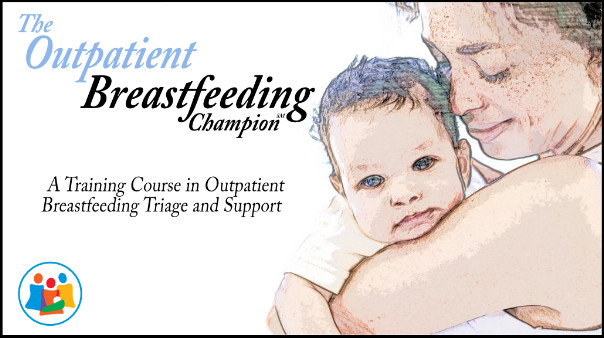Outpatient Breastfeeding Champion Course
Thursday & Friday, December 8 & 9th, 2022
8:30 am – 5:00 pm EST Each Day
with
Megan Whitacre MSN, RN, IBCLC and
Megan Schlachter MSN, APRN, FNPC, IBCLC
Details are included in our brochure which can be downloaded here.
Location
ProMedica Bay Park Hospital
Erie/Huron Conference Room
2801 Bay Park Drive
Oregon, OH, 43616
Registration
Please “Add to Cart” at the bottom of this page to reserve your seat to attend this in-person course.
Accreditation
A certificate listing credits earned will be available for download from your IABLE dashboard after the event evaluation is completed. Instructions for the evaluation will be emailed within 2-3 days after the course ends.
RN: This nursing continuing professional development education activity was approved by the Wisconsin Nurses Association, an accredited approver by the American Nurses Credentialing Center’s Commission on Accreditation. A maximum of 14.5 contact hours are awarded to Registered Nurses for successful completion.
IBCLC: This course has been allocated 14.5(L) CERPs recognized by IBLCE. Long Term Provider #117-04.
IABLE has been accepted by International Board of Lactation Consultant Examiners® (IBLCE®) as a CERP Provider for the listed Continuing Education Recognition Points (CERPs) programme. Determination of CERPs eligibility or CERPs Provider status does not imply IBLCE®’s endorsement or assessment of education quality. INTERNATIONAL BOARD OF LACTATION CONSULTANT EXAMINERS®, IBLCE®, INTERNATIONAL BOARD CERTIFIED LACTATION CONSULTANT®, and IBCLC® are registered marks of the International Board of Lactation Consultant Examiners.
RD: The Commission on Dietetic Registration has awarded Prior Approval of 14.5 CPEUs for Activity No. 172718 Suggested Performance Indicator(s) 4.1.2; 8.2.1; and 9.3.3.
Questions?
Please use our contact form to contact us with questions.
This training program is beneficial for medical office staff, providers, pharmacists, public health nurses, doulas, midwives, home visitors, WIC peer counselors, nutritionists, LLL Leaders, and health professional students and others who help mothers breastfeed.
Registration for This Event is Closed.
Please check our Event Calendar or Courseware Listings
for more Breastfeeding Support training.
For a number of reasons it is our policy not to permit registration for our events,
nor access to the recordings, after the event has occurred. These include policies of our accreditors and speakers, technical issues, and fairness to everyone who has registered.
Topics ↓
Abscesses | Alcohol | Anticipatory Guidance | Assessment of Infant Intake | Augmentation of Breasts | Baby Friendly Hospital Initiative | Bathing Infant | Bioactive Factors in Human Milk | Blebs | Block Feeding | Bottle Feeding | Bottle Preference | Breast Anatomy | Breast Massage | Breast Pumps | Breast Radiation | Breast Refusal | Cannabis | Chemotherapy | Chest Feeding | Child Care Resources | Colostrum | Composition Changes with Storage | Contraception | Contraindicated Medications | Counseling Principles | Cup Feeding | Delay in Lactation | Demographics | Dermatitis | Duration of Breastfeeding | Educational Resources | Emotional Support | Empowerment, Self-Efficacy | Engorgement | Feeding Frequency | Finger Feeding | Flange Fitting for Pumps | Fussy Breastfed Infant | Galactogogues | Gender Affirming Breast Surgery | Hand Expression | Healthy People 2030 | Herpes Simplex* | Herpes Zoster | Hormonal Control of Lactation | Hyperlactation | Indications for Supplementation | Induced Lactation | Infant Behavior at the Breast | Infant Biting | Infant Contraindications & Special Considerations | Infant Feeding Changes When Back to Work | Infant Feeding Cues | Infant Feeding Difficulties | Infant Risks of Not Breastfeeding | Infant Stooling & Voiding | Infant Suck Dynamics | Infant Symptoms Due to Hyperlactation | Infant Thrush | Infant Torticollis | Infant Weight Loss | Insufficient Glandular Tissue | Lactation Suppressants | Lactogenesis II | Lactogenesis II, Failure of | Latch & Positioning | Late Preterm | Legislative Policies Protecting Worker Rights | Low Milk Production - Perceived | Low Milk Production - Real | Lymph Node Changes | Lymphatic Breast Massage | Mastitis | Maternal Contraindications & Special Considerations | Maternal Diet During Lactation | Maternal/Parental Risks of Not Breastfeeding | Measuring Milk Transfer | Medication Information Resources | Methods of Supplementation | Milk Expression During Employment | Montgomery Glands | Nighttime Feedings | Nipple Discharge, Pathologic | Nipple Inversion | Nipple Piercing | Nipple Shields | Nipple Wound Management | Normal Breast Development | Oroboobular Dysproportion | Outpatient Follow Up After Hospital Discharge | Outpatient Management of Lactation | Paced Bottle Feeding | Pacifiers | Pharmacologic Principles | Plugged Ducts | Postpartum Hemorrhage | Pre & Post Feed Weights | Prenatal & Postpartum Counseling for the Lactating Parent & Family/Support People | Prenatal Breast Evaluation | Pump Trauma | Reduction Mammoplasty | Retained Placental Fragment | Reverse Pressure Softening | Rooming In | Separation of Lactating Parent and Newborn | Skin to Skin | Sleepy Infant | Slow Infant Weight Gain | Spoon Feeding | Storage & Handling of Human Milk | Storage Capacity | Subacute Mastitis | Substance Use Disorder | Supplementation Methods | Supplementers at the Breast | Tandem Nursing | Tobacco | Topical Medications for Nipples | Tubular Breast Deformity | Vasospasm | Weaning | Working with Lactation Consultants or Other Allied Health Professionals | Yeast Infection

